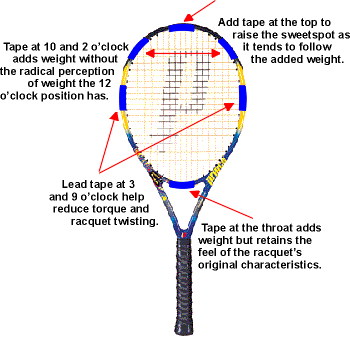Customizing Your Racquet
It's a Matter of Weight and Balance
by Kevin Pope
With racquets getting lighter and lighter, customizing a racquet
to meet individual specifications has become increasingly more
important. On the pro tour, it is rare to find a player using
a racquet right off the shelf, so why should you? Let’s
say you love the feel of a racquet but not it’s balance
or weight. With the help of the USSRA (the United States Racquet
Stringers Association) we can create a thumbnail sketch for customizing
a racquet and the options available. This article deals with
weight, in part II we will address balance.
The strategic application of weight to a frame can address
a variety of problems. Additional weight can increase power,
reduce frame torque (twisting) and vibration, and can
actually affect sweetspot location in a strung racquet. The information
included is designed to provide a basic understanding of customizing
racquet weight. Experimentation and player feedback will ultimately
determine the type of customizing required for an individual
player’s needs.
Adding Weight
Lead tape application is the usual means of adding weight
to a frame. Normal width lead tape (1/2") weighs about a
half-gram (0.5g) per inch. To gain frame stability, add weight
to the head at 3 o’clock and 9 o’clock. The most efficient way
to make a frame heavier is to add weight at the tip (12 o’clock)
of the frame. Experiment; keep adding weight until the racquet
feels too heavy, then begin to take some off. By placing lead
tape toward the tip of the frame, you also raise the area and
location of the sweetspot since the sweetspot tends to follow
the mass. If a player hits a lot of shots toward the top of the
string face, then placing a weight in that area might help. Likewise,
if a player tends to hit shots toward the sides, then weight
at the 3 and 9 o’clock positions would help. way
to make a frame heavier is to add weight at the tip (12 o’clock)
of the frame. Experiment; keep adding weight until the racquet
feels too heavy, then begin to take some off. By placing lead
tape toward the tip of the frame, you also raise the area and
location of the sweetspot since the sweetspot tends to follow
the mass. If a player hits a lot of shots toward the top of the
string face, then placing a weight in that area might help. Likewise,
if a player tends to hit shots toward the sides, then weight
at the 3 and 9 o’clock positions would help.
Caution: As a rule, players using superlight, head-heavy racquets,
such as Wilson’s Hammer and Sledge Hammer, should avoid
adding weight to the upper head area. If these players need a
heavier playing racquet, weight should be added to the throat
or handle areas.
If you want the racquet to feel heavier without increasing
its weight very much, add a small amount of weight to the top
and the butt of the racquet. Adding weight to the center of a
racquet can make it easier to control. It increases the weight
of the frame and provides more power without making the racquet
play a lot heavier.
Note: All other racquet variables being equal, a heavier racquet
will provide more power, assuming swing speed remains constant..
Remember some experimentation will probably be required to
get your racquet to feel right for you so don't be afraid to
try various amounts of weight and positions. The USRSA has a
list of professionals in your area who are trained in expediting
the process so there is no reason every player should not obtain
a perfect fit. For a list of certified racquet technicians in
your area contact the USRSA or visit their web page at http://www.usrsa.com. |
![]()